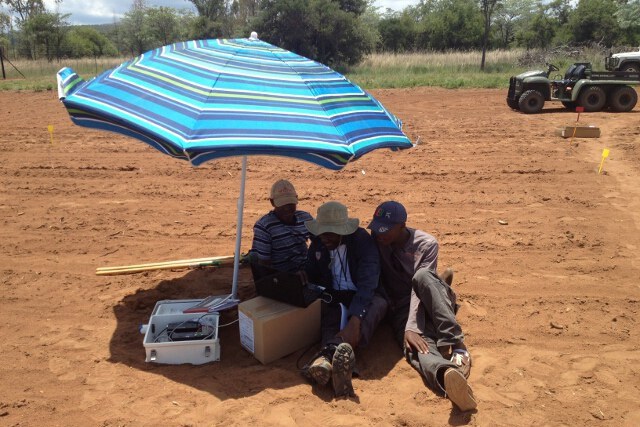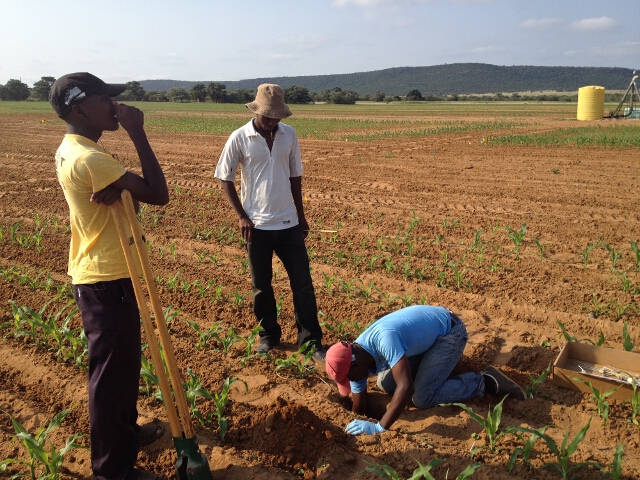This research site was developed in conjunction with the Howard G. Buffett Foundation focusing on the evaluation of maize and bean root system architecture for improved drought and other abiotic stress tolerances common in Sub-Saharan Africa.

A quiet day at the beach... er, the low phosphorus field
See the URBC photo gallery from the final year of URBC projects, 2014.
The Ukulima Root Biology Center was established by the Howard G. Buffet Foundation in Limpopo province, South Africa in 2009. The heart of the center is a 1,196 sq ft root biology laboratory. Large legume and maize screenings and low and high nitrogen plots are located in a 50 acre (20 ha) center-pivot field. Another 5 acres (2 ha) are under drip irrigation and have 8 blocks of low and high phosphorus split-plots. This facility enables drought, low nitrogen, low phosphorus and combined stresses to evaluate the functional utility of root traits in maize, sorghum, common bean, cowpea, groundnut and other crops grown by subsistence farmers in Africa.

Interns Rodney, Jacob, and Tsitso installing TDR probes in the center-pivot field in February 2012.
Every year several technicians from local universities complete internships under the guidance of Penn State students at the URBC. The internship includes hands on experience in experimental design, layout, and installation. Interns learn to evaluate plant performance throughout the growing season and to harvest and evaluate roots. Penn State students teach classes in plant biology, statistics, and the R statistical package. The experiences of these interns at the URBC give them a competitive advantage over their colleagues.

High-throughput phenotyping of maize root crowns at URBC is accomplished with the help of several interns to use scoreboards and to take anatomical samples.
Supporting equipment for field research includes soil coring tubes and supplies, an automated root washer, instruments for soil and plant tissue analysis and soil moisture content. Soil moisture equipment includes TDR probes with a datalogger and solar panels to power the system in the field (Campbell Scientifics). Two gator vehicles are used to take samples from the fields to the lab and garage area to be processed.

The plant nutrition laboratory has all the instruments required for the study of root biology and pertinent soil properties.
The lab building includes a wet lab with the following equipment: Perkin Elmer Lambda 25 UV-Vis spectrophotometer, Li-Cor 6400XT photosynthesis meter, PMS Pressure Instrument, lyophilizer for sample freeze-drying, microscopes for hand-sectioning roots, and a digital camera for imaging sections, analytical and other benchtop balances, a centrifuge and a shaker, laboratory drying oven, dry ice generator, flatbed scanner, a water purification system, fume hood, a tissue grinding mill, a muffle furnace, water bath, pipets, glassware and consumable supplies for sample processing/analysis and a large Echo-type plant biomass drier. The equipment allows for N and P analysis in soil, P analysis in plant tissue, and measurements of root length and other traits from soil cores. Digital cameras are also used to image root crowns for subsequent manual and automated analysis.

Penn State PhD student Larry York stands by a low N split-plot on the left and a high N plot on the right.
There is on-site lodging for 20 researchers and technicians. Under the existing sponsorship of the Howard G. Buffett Foundation, a Penn State agronomist lives at the center and supervises operations from October through April.
URBC projects were completed in 2014. The Roots Lab enjoyed a productive 5 years at Ukulima, with support from the HGB Foundation.

